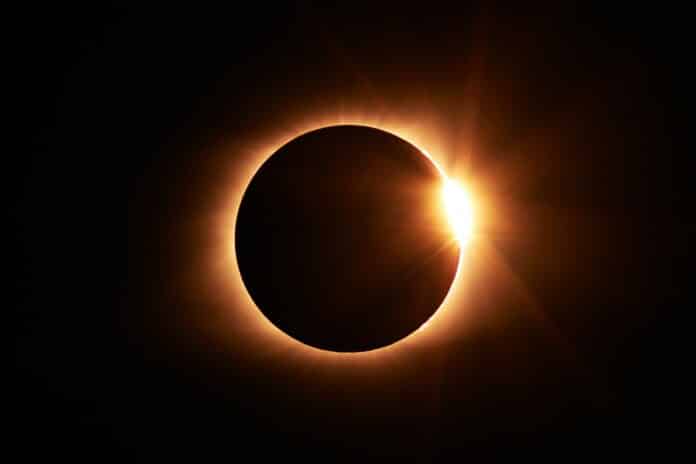On the 14th of October, 2023, a rare celestial event awaits us—the chance to witness a total solar eclipse. Be sure to set a reminder and secure some eclipse glasses; this promises to be a truly special spectacle!
Although the Merriam-Webster Online Dictionary defines an eclipse as the complete or partial obscuration of one celestial body by another, it fails to fully convey the intense thrill and excitement that individuals feel when the Moon passes in front of the Sun.
Furthermore, a total solar eclipse is an exceptionally rare occurrence in the vast expanse of our cosmos. With over 200 confirmed moons orbiting six major planets in our solar system (excluding Mercury and Venus), only our Moon is perfectly positioned in terms of size and distance from Earth to delicately conceal the radiant solar disk and reveal the otherworldly solar corona. Looking at it from a different angle, although total solar eclipses occur roughly once a year or two somewhere on Earth, any specific location on our planet undergoes the Moon’s shadow darkening its surface only approximately once every 400 years, rendering totality genuinely rare.
The Sun, boasting a diameter of 865,000 miles, surpasses the Moon’s 2,160-mile diameter by approximately 400 times. Additionally, it is positioned an average of 400 times farther away—93 million miles compared to the Moon’s 240,000 miles. This distinctive arrangement leads to both celestial bodies presenting an almost identical angular size in the sky, measuring around ½°, roughly half the width of your pinky finger when extended at arm’s length. This precise alignment plays a pivotal role in the occurrence of total solar eclipses. Even a slight deviation in the Moon’s size or distance from Earth would disrupt its capability to fully obscure the solar disk or obstruct the solar corona, thereby diminishing the awe-inspiring nature of eclipses.
Contrary to widespread belief, the Moon does not completely obscure the Sun every month; such frequent occurrences would diminish the rarity of experiencing totality. Even when the Moon approaches the Sun, the solar disk is not consistently fully covered. Specifically, during the new Moon phase—the sole lunar phase suitable for a solar eclipse—the Moon frequently fails to align perfectly with the Sun. Considering these intricate variables, the phenomenon of eclipses, in and of itself, remains a surprising occurrence.
The cosmic alignment responsible for total solar eclipses is not permanent. The Moon is gradually moving away from Earth at a rate of about 1.5 inches (3.8 centimeters) per year, causing its apparent diameter to decrease. Eventually, the Moon will be too small to completely obscure the Sun, making total eclipses no longer visible from Earth’s surface.
While the exact timing of this cosmic shift is uncertain due to factors like the variable rate of lunar retreat and the stability of the solar diameter, scientists estimate that roughly a billion years from now—give or take a few hundred million years—the Earth’s surface will witness its final total eclipse of the Sun. Annular eclipses will endure, but the portion of the solar surface concealed by the Moon will gradually decrease.
So, when you find yourself standing in the lunar shadow, witnessing the Moon pass between Earth and the Sun, revel in the knowledge that you are partaking in one of the most extraordinary and magnificent events in the cosmos.
To view the path of the solar eclipse, check out these websites:
https://www.axios.com/2023/10/05/solar-eclipse-ring-of-fire-october-2023
https://science.nasa.gov/eclipses/future-eclipses/eclipse-2023/where-when/
Community Solar Eclipse Watch Parties:
NASA Eclipse Ambassador Solar Eclipse Watch Party
Date: Saturday, October 14, 2023
Time: 10:00 a.m. – 2:00 p.m.
Location: PHSC West Campus 10230 Ridge Road, New Port Richey, FL 34654
Description: Join us for an unforgettable solar eclipse experience hosted by our PHSC-certified NASA Solar Eclipse Ambassadors! Enjoy free pizza and refreshments. The first 200 attendees will receive free eclipse glasses!
Activities Include: Watching the solar eclipse, Solar telescope observations, Creating your own pinhole
viewer, Learn about eclipse safety, DIY galaxy cookies and more!
Contact Information: Aaron Ellerman, Public Information Officer, 727-816-3259, [email protected].
Eclipse Watch Party
East Hernando Meeting Room – 6457 Windmere Rd. Brooksville, FL 34602
Date: Saturday, October 14, 2023
Time: 12:45 p.m. – 2:00 p.m.
Spring Hill Meeting Room – 9220 Spring Hill Dr. Spring Hill, FL 34608
Date: Saturday, October 14, 2023
Time: 12:45 p.m. – 2:00 p.m.
Description: Join us for an eclipse watch party! We will be reading a story, making a craft, and viewing the eclipse. All registered attendees will receive specialized eclipse glasses. Space is limited. Registration required.

